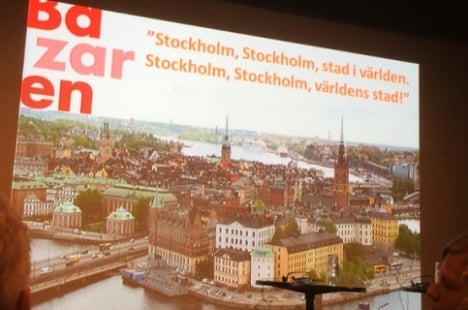Back in 1981, one of Sweden's first rock stars recorded a song named after the country's capital. It went something like this:
Stockholm, Stockholm, stad i världen
Stockholm, Stockholm, världens stad
Stockholm, Stockholm, härlig är den
Stockholm, Stockholm, gör mej glad.
Roughly translated, ’Stockholm is a city of the world, it’s wonderful, and it makes me happy’.
It was a hit.
It was also the theme of a seminar and panel discussion that took place on Friday at the Bazaren job fair, one of Sweden’s largest.
Representatives from municipal and county governments joined speakers from academia and local companies to discuss a topic close to everyone’s hearts: what is the future of Stockholm and its labour market?
“Stockholm is the growth engine of Sweden,” event host Mats Hedenström from the Stockholm County Administrative Board told the audience.
“The city accounts for an entire third of Sweden’s growth.”

But as well-positioned as the city may be, the country nevertheless faces several challenges, many related to population growth expected to add 1.3 million new residents in the next 20 years.
“If we look at the trends we can see that Sweden will have a population of 10.9 million by 2035,” Karin Grunewald from Sweden’s statistics agency (SCB) explained.
While a growing population presents certain opportunities, it can also create imbalances in the labour market, as jobs agency analyst Julia Asplund pointed out.
“We will see a shortage of healthcare professionals and teachers,” she noted, despite that the number of jobs available in Stockholm is expected to increase by 21,500 this year.
In order to meet increased demand for healthcare professionals in Sweden, and in Stockholm in particular, immigration is seen as a source of workers with the right competencies.
Moreover, immigration is expected to account for most of Sweden’s population growth over the next two decades, SCB’s Grunewald explained, at the same time as the country’s labour force is aging.
“Up to 70 percent of the labour force today is over age 45,” Grunewald said. ”We need a surplus of immigration, or we will have a shortage of doctors, despite the efforts that have been made to increase education.”
Asplund from the jobs agency agreed.
”Immigrants are totally necessary for the healthcare sector,” she said.
However, taking advantage of Sweden’s educated immigrant population is not always as simple as it appears.
“It needs to be easier to obtain a Swedish nursing license,” Asplund added.
And the problem is not limited to the healthcare sector, as Ola Törnros from app maker Soft Solutions Partner explained.
“I had a colleague from Pakistan who had finished his degree here in Sweden, and then found out it would be 14 to 18 months before he could even get a work permit,” he said.
“It’s vital for our company that our employees come from all around the world,” he added. “I am the only Swede at the office in Västerås. My boss is from Congo. You have to be able to adapt and create products in a global context.”
But challenges arise when foreign recruits struggle to even stay legally in Sweden, he added.
Read also: Stockholm job fair helps immigrant entrepreneurs
“If you offer someone an immediate position in Silicon Valley or a job in 14 months in Sweden, what are they going to choose?” Törnros prompted the audience.
But one of the largest issues making life difficult for foreign professionals, according to Stockholm Business Region CEO Olle Zetterberg, is the Swedish capital’s housing crisis.
“We have to make it easier to move here,” Zetterberg said. “The housing issue is at the very top of the list of hindrances.”
Susanna Jansson, analyst from Tillväxtverket (the Swedish Agency for Economic and Regional Growth), confirmed that housing is a common obstacle to growth, but said that a broader perspective is necessary.
"This is an issue which affects more than just education, infrastructure, or housing," Jansson said. "We have to find methods for public agencies and private companies to work together to lower the threshold for integration."

Sergels torg, and Kulturhuset, where the event was held. Photo: Shutterstock
In short, positioning Stockholm as a magnet for talented foreign professionals is no easy task. But despite the challenges, the panelists and seminar attendees appeared to agree on one thing: immigration is critical.
“Diversity is a foundation,” Johan Rosenblom, country manager of Starbucks operations in Sweden, remarked.
“It’s a value that must be built into the company itself. Diversity, tying together many nationalities and cultures into one company, is one of the keys to success.”
This also means, the panelists agreed, that Sweden must get better at welcoming immigrants and making use of the talents of those who are already in Sweden.
“There are plenty of Syrians here who have more education than Swedes. And we’re complaining about it,” Törnros exclaimed incredulously.
Emilia Bjuggren, labour council chairman Stockholm City, agreed.
“We have a shortage of certain professions, and we have to make it easier to validate immigrants’ education,” she said. “We also must develop SFX courses, specialized Swedish courses for certain professions, in place of SFI.”
While no specific proposals emerged from the event, there appeared to be a consensus among panelists and audience members about the challenges ahead.
Stockholm may be a beautiful city – but if it wants to truly be a city of the world, as the old song shouts so proudly, there is still plenty of work to do. The city cannot celebrate its growth unless its inhabitants, new and old, are welcomed into society and the labour market alike.
Or as Törnros put it:
”We must start viewing each and every immigrant as a unique person.”
This article was sponsored by Verksamt.se and produced by The Local.


 Please whitelist us to continue reading.
Please whitelist us to continue reading.